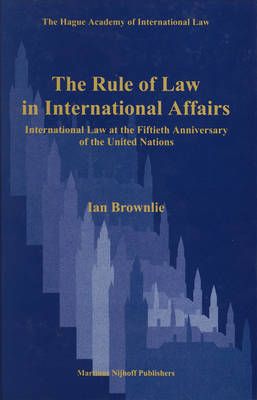
- Afhalen na 1 uur in een winkel met voorraad
- Gratis thuislevering in België vanaf € 30
- Ruim aanbod met 7 miljoen producten
- Afhalen na 1 uur in een winkel met voorraad
- Gratis thuislevering in België vanaf € 30
- Ruim aanbod met 7 miljoen producten
Zoeken
The Rule of Law in International Affairs
International Law at the Fiftieth Anniversary of the United Nations
Ian Brownlie
€ 317,45
+ 634 punten
Omschrijving
This volume consists of a carefully edited version of the General Course on Public International Law delivered at the Hague Academy of International Law to commemorate the fiftieth anniversary of the foundation of the United Nations. The author brings to them not only his background of academic distinction, but his experience as a practitioner concerned with major international legal issues.
The rule of law in international affairs is a question of perennial concern but it is of greater moment these days for a number of reasons. The active agenda of the Security Council and its relative solidarity creates a paradox. Its increased political power is a source of hope but the modalities of the exercise of power present problems of principle and of legal concern. Another area of concern is the International Court, which has had a successful record since the early eighties and provides one of the guarantees of the maintenance of legality. Recent successes of the Court include the effective resolution of the territorial dispute between Chad and Libya. The general level of compliance with its decisions by States is impressive. Yet its success is matched not by encouragement and enhancement of its facilities but by United Nations financial constraints which hinder its work and, ultimately, may threaten its independence in relation to the political organs of the United Nations.
The rule of law in international affairs is a question of perennial concern but it is of greater moment these days for a number of reasons. The active agenda of the Security Council and its relative solidarity creates a paradox. Its increased political power is a source of hope but the modalities of the exercise of power present problems of principle and of legal concern. Another area of concern is the International Court, which has had a successful record since the early eighties and provides one of the guarantees of the maintenance of legality. Recent successes of the Court include the effective resolution of the territorial dispute between Chad and Libya. The general level of compliance with its decisions by States is impressive. Yet its success is matched not by encouragement and enhancement of its facilities but by United Nations financial constraints which hinder its work and, ultimately, may threaten its independence in relation to the political organs of the United Nations.
Specificaties
Betrokkenen
- Auteur(s):
- Uitgeverij:
Inhoud
- Aantal bladzijden:
- 264
- Taal:
- Engels
- Reeks:
- Reeksnummer:
- nr. 1
Eigenschappen
- Productcode (EAN):
- 9789041110688
- Verschijningsdatum:
- 1/08/1998
- Uitvoering:
- Hardcover
- Formaat:
- Genaaid
- Afmetingen:
- 155 mm x 235 mm
- Gewicht:
- 1199 g

Alleen bij Standaard Boekhandel
+ 634 punten op je klantenkaart van Standaard Boekhandel
Beoordelingen
We publiceren alleen reviews die voldoen aan de voorwaarden voor reviews. Bekijk onze voorwaarden voor reviews.











